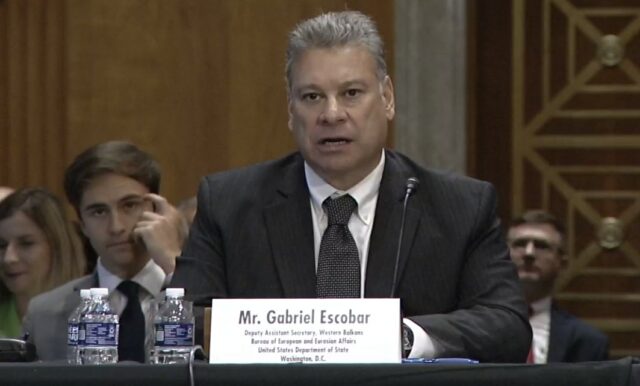Testimony for Deputy Assistant Secretary Gabriel Escobar Senate Foreign Relations Committee Hearing on U.S. Engagement in the Balkans May 18, 2023
Chairman Menendez, Ranking Member Risch, distinguished Members of the Committee, I appreciate your invitation to discuss the Biden Administration’s Western Balkans policy.
The United States is working closely with European partners and Allies to ensure that the door to transatlantic institutions remains open, and the path to membership in the European Union remains credible and concrete. At the same time, the countries of the Western Balkans must implement the reforms necessary to qualify for membership. We are helping them build capacity to fight the pervasive corruption and disinformation that make the region more susceptible to malign influence, and to resolve lingering tensions that continue to threaten regional stability and integration. And our work in the Western Balkans also strengthens Europe as a geostrategic, global partner.
As the Counselor noted, a major obstacle to enduring peace and prosperity in the Western Balkans is the fraught relationship between Kosovo and Serbia. The EU- facilitated Agreement on the Path to Normalization of Relations and its implementation annex, agreed to in February and March, were major steps toward bringing peace and predictability to the relationship. Implementation is underway. On May 2, the Serbian president and Kosovan prime minister began discussions on the Association/Community of Serb-majority Municipalities and reaffirmed their commitment to resolve the fate of Missing Persons to foster reconciliation and peace. I have repeatedly traveled to Brussels and across the region to support this process. The United States will remain engaged with Kosovo, Serbia and our European partners to urge fulfillment of all obligations under Dialogue agreements. For too long, failure to make progress has allowed Russia to play a spoiler role against Serbia’s strategic goal of European integration — which the Serbian people strongly desire, and we strongly support. Both Serbia and Kosovo must normalize relations to unleash their full potential and progress on their respective EU paths.
In Bosnia and Herzegovina, years of dysfunction and division have plagued state and entity-level governments, undermining the country, its Euro-Atlantic aspirations, and the future of its citizens. Ethnonationalist political leaders from all constituent peoples—Serbs, Croats, and Bosniaks— often pursue narrow personal and political gain rather than the public good. The United States is now engaged in an intensive effort to strengthen the international community’s work to uphold the Dayton Peace Agreement.
The High Representative used his Bonn Powers to ensure that elections were held last October and to break a four-year deadlock on Federation government formation. The United States strongly supported these difficult but necessary decisions. With new state and entity-level governments in place, we can now help Bosnia and Herzegovina’s leaders to implement long-overdue reforms and advance their citizens’ Euro-Atlantic aspirations.
We are deeply alarmed by Republika Srpska President Milorad Dodik’s persistent secessionist and anti-democratic actions. In cooperation with European partners, we will work to deter Dodik from pursuing de facto separation and limit resources to fund his divisive practices. We continue to support a robust EU Force Operation Althea mission to preserve Bosnia and Herzegovina’s sovereignty, territorial integrity, and multiethnic character. And the United States will continue to deploy sanctions against those throughout the region who threaten or undermine Bosnia and Herzegovina’s institutions, or the Dayton Peace Agreement.
There are also bright spots in the region: In Montenegro, we are seeing renewed momentum to realize its European future. Recent presidential elections were smooth. Montenegro re-established a quorum on its Constitutional Court. Its leaders must now work to fill the remaining court vacancy and other critical judicial appointments. We hope to see free and fair parliamentary elections on June 11, and that newly elected leaders will heed the call of the people and move quickly on needed reforms to advance Montenegro’s EU integration.
Both Albania and North Macedonia have opened EU accession negotiations; both are helpful partners in supporting normalization between Serbia and Kosovo; and, like Croatia and Montenegro, both are stalwart NATO Allies.
To further its EU aspirations, North Macedonia has committed to enacting a constitutional change to recognize its Bulgarian minority. We strongly support this difficult but necessary step.
Iran’s devastating cyberattacks on Albania last year underscored that we must continue to assist Allies and partners in the region to strengthen their security. The United States has committed approximately $50 million in cybersecurity assistance to Albania’s civilian and military sectors — one of our largest cyber support contributions to any individual country to date.
To close, as we work to help create a stronger Western Balkans within a stronger Europe, continued Congressional interest in, and engagement on the Western Balkans is invaluable. Like Counselor Chollet, I welcome your questions today.
